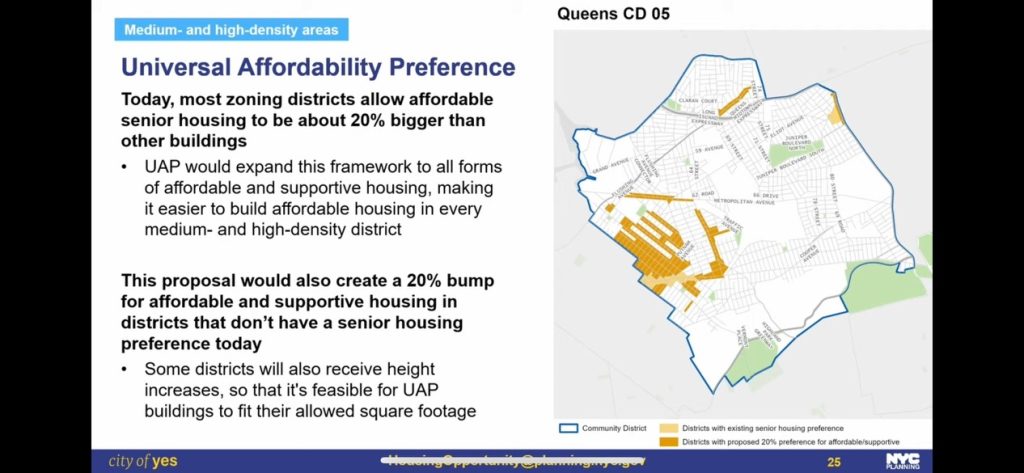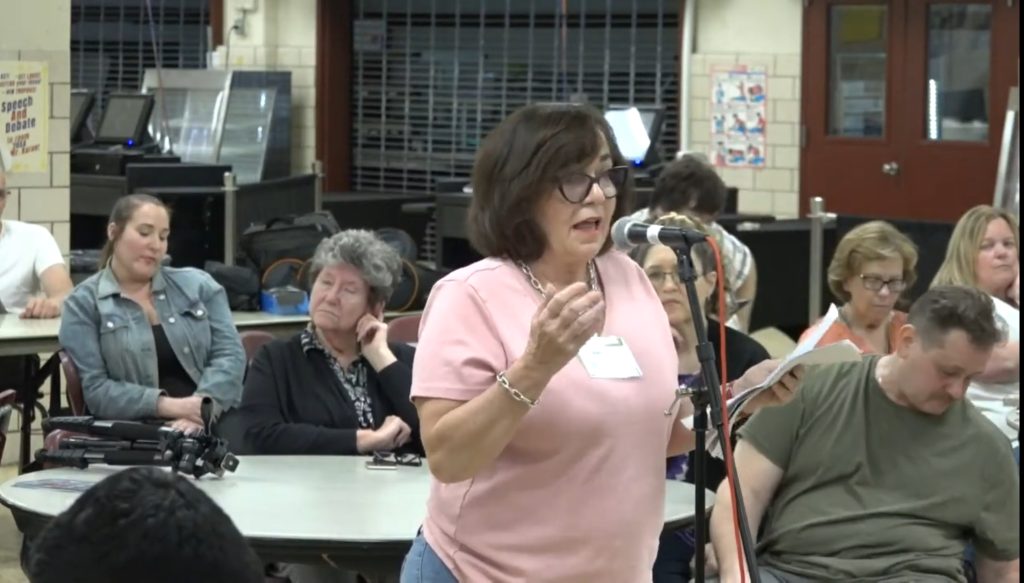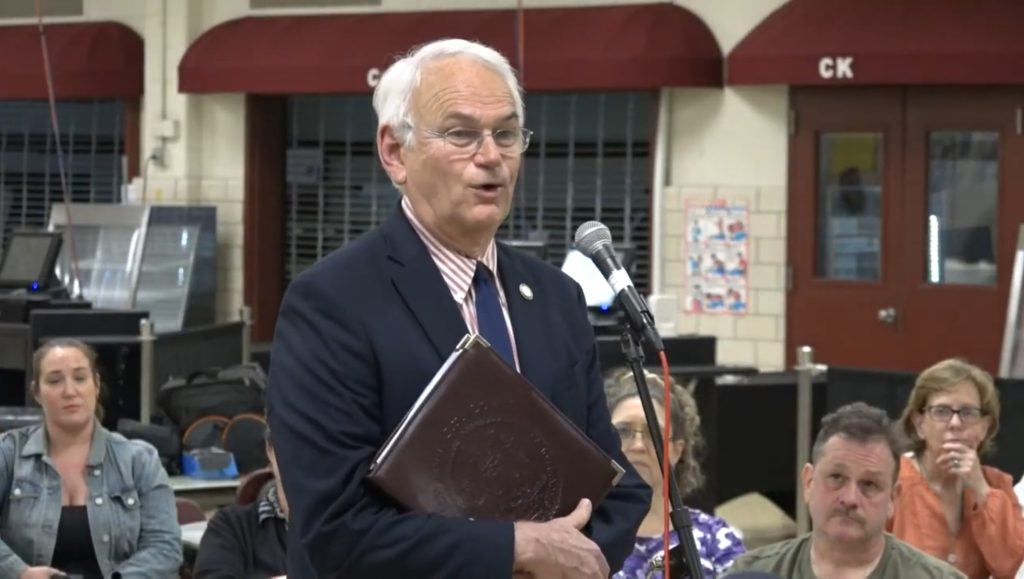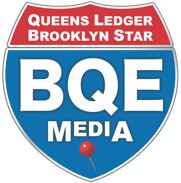MOHAMED FARGHALY
mfarghaly@queensledger.com
Tensions flared at the Community Board 5 meeting in Middle Village as residents and officials clashed over the hotly debated “City of Yes” housing opportunity zoning text amendments. The meeting was held in the Christ the King High School Cafeteria on May 8.
Emotions ran high as residents, city officials, and community leaders engaged in a passionate debate surrounding the proposed “City of Yes” zoning text amendments aimed at expanding housing opportunities. Against a backdrop of growing concerns over housing affordability and urban development, the meeting became a focal point for diverging opinions and competing interests within the community.

Courtesy CB5
The City of Yes initiative, presented by representatives of the N.Y. City Dept. of City Planning, aims to address housing needs and stimulate economic growth through strategic zoning amendments.
The presentation by Representatives of the N.Y. City Dept. of City Planning unveiled more details about the ambitious “City of Yes” initiative, which aims to tackle New York City’s pressing housing needs through a series of strategic zoning amendments and policy reforms. This initiative underscores the pivotal role of housing not only in shaping the fabric of urban life but also in driving economic growth and social equity within the city.
At the heart of the presentation was a compelling argument regarding the economic ramifications of housing scarcity. It was emphasized that when a significant portion of residents’ income is absorbed by housing costs, it leads to decreased consumer spending in other sectors, thus constraining overall economic activity. By expanding housing availability, the initiative seeks to alleviate this financial burden on residents while simultaneously injecting billions into the city’s economy and generating hundreds of thousands of new jobs, predominantly in construction and residential maintenance sectors.
The discussion also delved into the intricate relationship between zoning regulations and housing supply dynamics. Zoning laws dictate not only the size and density of buildings but also their designated uses, influencing the very fabric of urban development. The proposed amendments aim to modernize and streamline these regulations, removing obstacles such as outdated parking mandates and overly restrictive zoning rules. By doing so, the initiative aims to foster a more diverse and inclusive housing landscape that caters to the evolving needs of New Yorkers.
Furthermore, the presentation elucidated the multifaceted approach of the “City of Yes” initiative, which encompasses a range of strategies to promote housing affordability and accessibility. From incentivizing the construction of affordable housing units to facilitating the conversion of non-residential buildings into residential spaces, the initiative seeks to create a more equitable housing environment across all neighborhoods. Additionally, innovative solutions such as transit-oriented development and the legalization of accessory dwelling units are proposed to maximize housing opportunities while promoting sustainability and community well-being.
The concerns raised by residents regarding the “City of Yes” initiative reflect a range of apprehensions and skepticism about the proposed changes to housing policy in New York City and their neighborhood and the communities.
Firstly, there’s a sentiment that the initiative appears to heavily favor developers rather than addressing the needs of existing residents. Many feel that the proposed amendments will lead to unchecked development, potentially resulting in the transformation of quiet, low-density neighborhoods into high-density commercial zones. Residents are worried about the impact on quality of life, including increased traffic congestion, loss of green space, and a shift in the character of their communities.
The issue of parking requirements is also contentious, with residents expressing concerns about the elimination of parking mandates for new developments. Many believe that this will exacerbate existing parking problems in both high-density and low-density neighborhoods, leading to increased competition for limited parking spaces and potentially higher rents without any tangible benefits for residents.
There was also skepticism about the efficacy of the initiative in addressing the city’s housing shortage. Some residents question the need for additional housing units, especially considering the recent decrease in population due to factors such as the COVID-19 pandemic. They argue that the focus should be on providing affordable housing options rather than catering to market-rate developments that may further exacerbate gentrification and displacement.
Residents also express frustration with the lack of transparency and community input in the decision-making process. Many feel overwhelmed by the complexity of the proposed changes and believe that there hasn’t been adequate opportunity for meaningful engagement or discussion.

Courtesy CB5
Kathy Masi and other residents expressed deep concerns about the initiative’s potential impact on lower-density communities, citing worries about unchecked development and lack of transparency.
Residents and community figures like Kathy Masi from Glendale expressed deep concerns about the “City of Yes” initiative, highlighting its potentially devastating impact on lower-density communities.
“In all the years I’ve been on this community board, I don’t ever remember taking speaking time to address a city proposal, basically because I never really felt that would have a great impact on our community,” Masi said. “However, the city of Yes proposal is very different. It will have a devastating impact on lower density communities such as ours.”
She points out the lack of environmental impact studies and questions why Mayor Adams is aggressively pushing for this initiative. Masi, along with other residents, believes that the proposal primarily benefits big real estate developers without offering any tangible benefits to residents, particularly homeowners and tenants in communities like hers.
Catherine Muraski was next to speak, as she serves as the Vice President of the Liberty Park Homeowners Association, an organization with nearly a century of history.
“Civic associations are very important when it comes to communities, and we will be the first of many to vote no for the city of mess. Governor Hochul, Mayor Adams and most of the city council think they can choose this,” Muraski said. “With these overdevelopment philosophies, they intend to take away the American dream from us native New York New Yorkers who all own a home and even rent in the end.”
Long-time community board member Fred Hoefferle voiced concerns over the City of Yes initiative during the public forum. Hoefferle, a resident and community board member of nearly 30 years, highlighted the paradox of relaxed parking regulations amidst existing shortages, noting the familiar sight of double-parked cars during alternate side parking days. He questioned the logic behind further easing restrictions given the city’s population decline post-pandemic, challenging claims of a housing shortage.
“Since the pandemic, the city has lost probably well over a half a million people,” Hoefferle said. “It’s hard to believe that having lost that many people, there is now a housing shortage. Where was the housing shortage in 2019?”
Residents also express frustration with the lack of transparency and community input in the decision-making process. Many feel overwhelmed by the complexity of the proposed changes and believe that there hasn’t been adequate opportunity for meaningful engagement or discussion.
Middle Village resident Frank Artim expressed mixed sentiments. acknowledging the complexity of the issue, raised concerns about transit access and the potential impact on local businesses and community cohesion. Reflecting on the diverse fabric of neighborhoods, Artim questioned the initiative’s goal of homogenizing the city without regard for individual differences.
“The bottom line is much of what people are saying here is about keeping the fabric of a community, I don’t know where you grew up, or you know, anything like that,” Artim said. “But a lot of the people here know what it is to have a mom and pop shop, and everything that goes along with it. Now, apparently, from what we’re hearing, you’re looking to make the whole city as one big happy family without any differential differentiation from one person to another.”
Community representatives Robert Holden and Joanne Ariola from CB5 made a rare in-person appearance at the meeting to voice their opposition to the “City of Yes” initiative.
“I one hundred percent agree with everyone who spoke out against the City of B.S,” Ariola said. “We do not need more density, we do not want that character of the community, we don’t want less regulation… This text amendment is enormous, why isn’t it broken down? Why are we voting on it in it’s entirety? It’s because this is just a way to just shuffle it in.”
“You know I’m against the City of Yes,” Holden said. “It’s doing everything we’ve fought against during there 90’s and early 2000s. They want to allow everything we fought against… It’s a tragedy that they are trying to destroy our neighborhood.”

Courtesy CB5
Robert Holden criticized the proposal for appearing to heavily favor developers without adequately addressing the needs of existing residents, particularly homeowners and tenants in communities.
In summary, the Community Board 5 meeting showcased a passionate debate over the “City of Yes” housing opportunity zoning text amendments. While city officials presented the ambitious initiative as a solution to New York City’s housing needs and economic growth, residents voiced concerns about unchecked development, loss of community character, and a perceived lack of transparency in decision-making.
“As residents of Queens, it is our jobs to contact the city council representatives, many communities such as Glendale are represented by more than one, let them know we want them to vote against the City of Yes,” Masi said. “The power is with the city council, the mayor needs to hear from the council that this does not work.”

